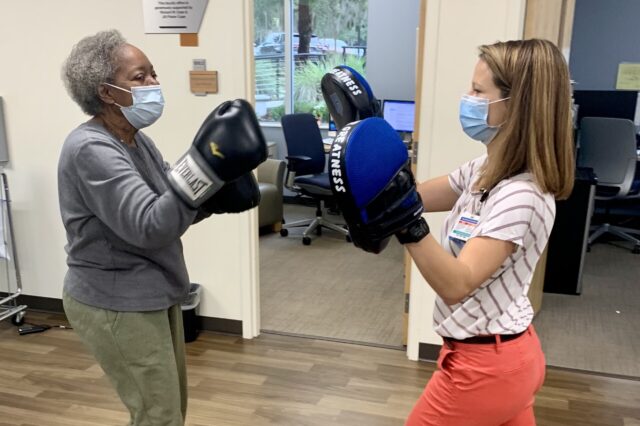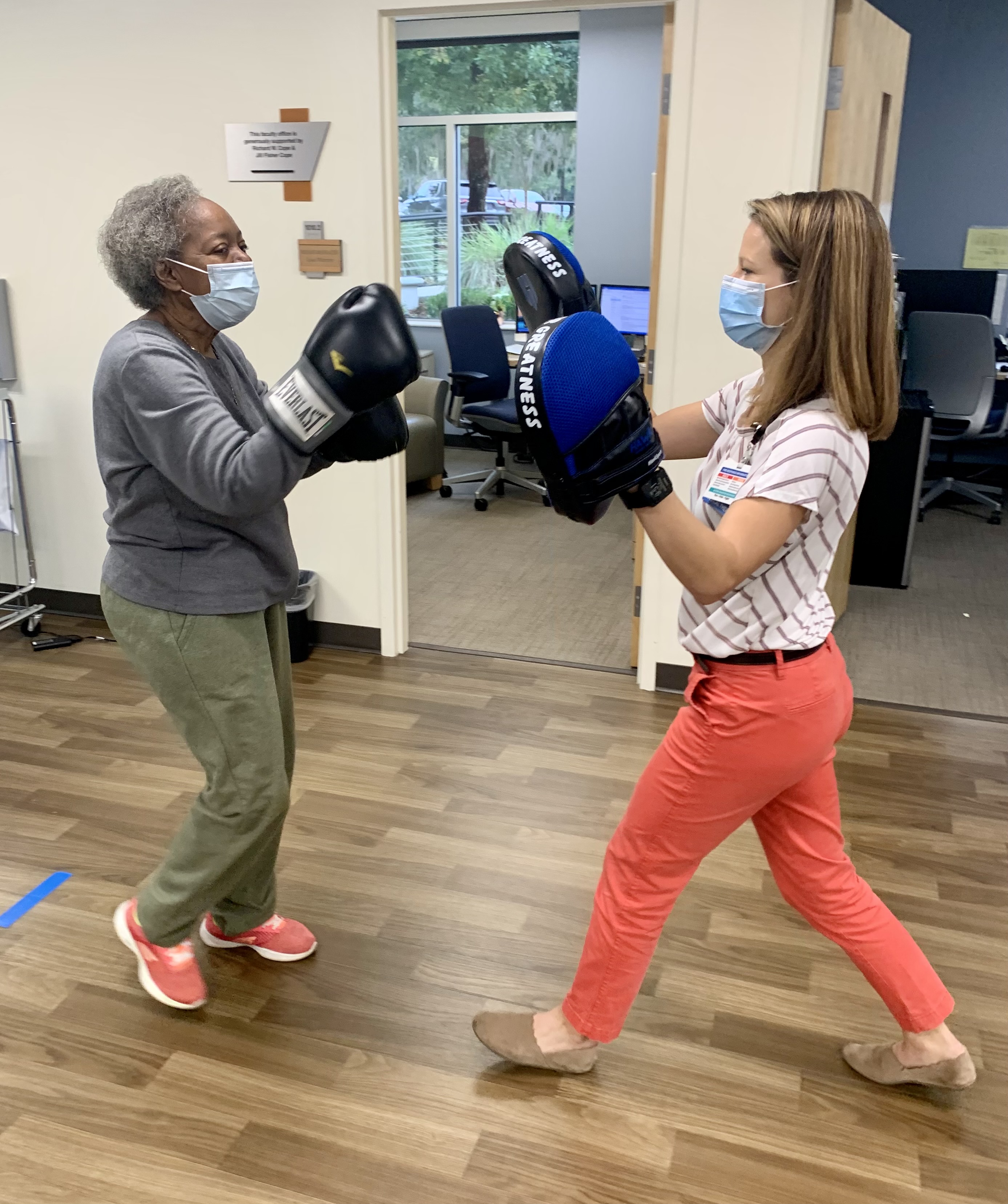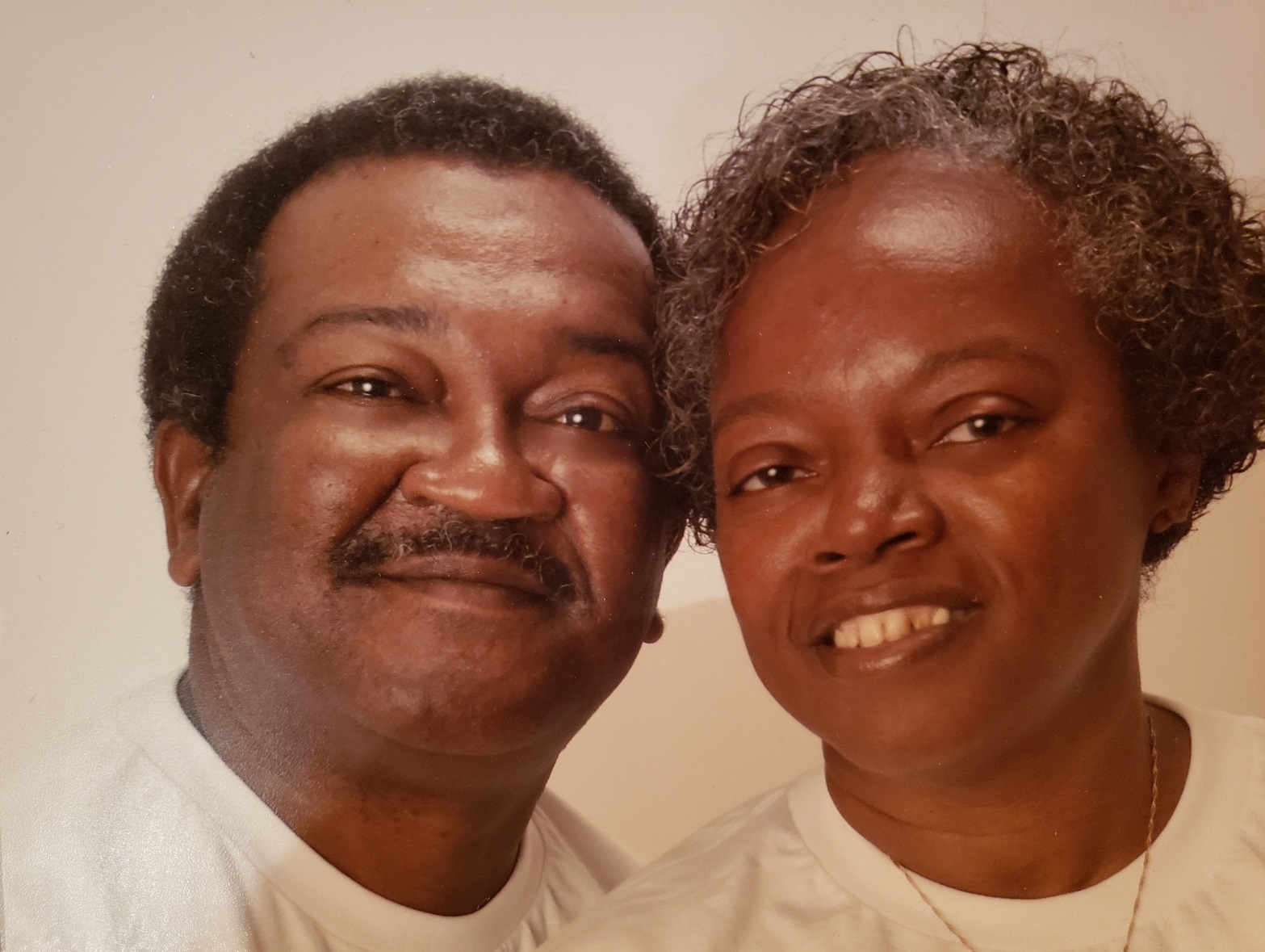Facing Parkinson’s Disease Head-On
Some slight tremors. A shuffle when walking. These few symptoms are what Carolyn Douglas noticed about five years ago. She didnt know then, and wouldnt for a while, that they were the first signals of Parkinsons disease.

Some slight tremors. A shuffle when walking. These few symptoms are what Carolyn Douglas noticed about five years ago. She didn’t know then, and wouldn’t for a while, that they were the first signals of Parkinson’s disease.
At first, Carolyn wasn’t terribly concerned. She had seen some of her aunts in her family go through similar issues when they were her age; she thought it was probably just genetic. But as her hand tremors continued, she and her husband Lonzo decided they needed to see a neurologist.
For two years, Carolyn saw a neurologist in Ocala who never diagnosed her with Parkinson’s disease and only treated her for symptoms of parkinsonism. She said she was more frequently seen by a nurse practitioner and was given medication that didn’t help with her tremors. After two years, with her symptoms getting worse and frustration mounting, Carolyn sought help and advice from her primary care doctor, Mitul Jones, MD, with UF Health Family Medicine — Haile Plantation.
Dr. Jones, whom Carolyn and Lonzo call “exceptional,” immediately referred Carolyn to Adolfo Ramirez, MD, at the Norman Fixel Institute for Neurological Diseases at UF Health. Once Carolyn saw Dr. Ramirez, she immediately noticed a “180-degree” flip in the care she was receiving. Carolyn said she and Lonzo were given many resources, tools and help that they desperately needed to understand how to not only “get through” Parkinson’s, but actually to live.
However, along with getting the care she needed, Carolyn had to deal with facing the reality of an actual diagnosis: She did, in fact, have Parkinson’s disease. This new reality was not something Carolyn was initially ready to face.
“Once you tell your mind something is real, you have to accept it,” she said.
Facing her diagnosis head-on was difficult, but with the support from her husband and her team of doctors, Carolyn came to the realization that if she acknowledged her situation, and then actually did something about it, she would be OK. She had a team of supporters behind her, resources to rely on and a husband dedicated to helping her overcome any obstacles.
After seeing Dr. Ramirez, Carolyn was put on levodopa, the most potent medication available for Parkinson’s. Additionally, she was referred to continuous physical therapy with Alison (Ali) Kraus, PT, DPT, NCS, who is also at the Fixel Institute, to help strengthen her body and improve her quality of life. 
“Parkinson’s wants you to stay still, but now she moves, we move,” Lonzo said. “Ali was instrumental in helping us understand that. She explains what is happening physically and mentally with Carolyn and why things click in certain ways.”
Carolyn and Lonzo credit this multidisciplinary team approach to her health for changing the trajectory of Carolyn’s life.
“UF Health provides exceptional service, and it’s really good to be under that umbrella,” Lonzo said.
In This Together
Whether it’s physical therapy exercises, eating healthy or going on a walk even when they don’t want to, Lonzo is right alongside Carolyn in this journey. The couple has been together since 1965 and married for 51 years. When Carolyn was diagnosed with Parkinson’s, Lonzo wasn’t sure how he could help, but he quickly learned how to approach situations differently so he can help her by doing things she may need help with and knowing things she needs to do for herself.
“She can be stubborn, but I love her very, very much,” Lonzo said.
This love and care is evident to Ali when they both come to physical therapy.
“Carolyn and her husband tackle her symptoms of Parkinson’s disease with a team approach,” Ali said. “Carolyn admits to sometimes not wanting to come to therapy, but once she is here, she always feels better.”
“I even tattle on her if she isn’t doing her physical therapy at home,” Lonzo joked.
Finding a Community
In addition to finding the care Carolyn needed at UF Health, the couple found a community. Both Carolyn and Lonzo participate in a program called Dance for Life that they were referred to by Ali. The Dance for Life program is a free weekly dance class for those with Parkinson’s disease and their significant others. It helps improve quality of life through enhanced physical well-being, social interaction with other patients who may be going through similar situations and uses targeted movements to help with balance, strength and mobility.
The Douglases have also been on the “Panel of PD All-Stars” every year. This hourlong lecture for the UF Doctorate of Physical Therapy program is given by Ali herself, a board-certified clinical specialist in neurologic physical therapy, and brings together four to six patients with Parkinson’s disease and their caregivers or spouses to tell students about their experiences, both good and bad. It allows students to ask the patients anything they want and get many real-life conversations going, showing students the wide variety of “looks” that Parkinson’s disease can have, as no two patients are the same.
Lonzo expressed how helpful these programs are.
“UF Health put us in a situation where we could interact with other people who are in a similar situation. They gave us a community to talk about how we feel as a couple. We can listen to others and get feedback. We don’t have to walk this road alone. There are people we have met who have dealt with Parkinson’s disease for years. We get different ideas on how to manage it.”
Looking Toward the Future
As Carolyn and Lonzo look toward their future, they are filled with hope and positivity. Through the help of Dr. Ramirez and Ali, her shuffle and tremors have subsided. She can even walk backward now. 
“She moves faster than me,” Lonzo said.
Ali said Carolyn and Lonzo work on dynamic stretching, balance exercises and gait training to help Carolyn maintain her strength.
Carolyn said without coming to UF Health to seek treatment, she probably would not have accomplished nearly what she has. Lonzo said the knowledge alone that they’ve gained through Dr. Ramirez, Ali and the programs they participate in has been “tremendous” in easing the couple’s stress and anxiety. Dr. Ramirez said Carolyn has been a diligent, resilient patient, following medical and therapeutic advice.
“Also, she has been an avid participant in clinical research and advocacy for Parkinson’s disease in her community. We are so grateful for her support,” he said.
To those who may be hesitant to seek treatment, or give their Parkinson’s symptoms “a name,” Carolyn suggests: “Step out of that place, recognize what it is and do something about it — you will be OK. Put in the work and you will see progress.”
At age 69, she is on the verge of starting a new business. She will be a vendor offering military memorabilia to veterans, like Lonzo, on different bases around the state. It’s safe to say she will be walking confidently into this new role, with Lonzo, her teammate and biggest supporter by her side — even backward, if she wants.
Carolyn and patients like her have helped pioneer the “Power in Knowing” program at the Norman Fixel Institute for Neurological Diseases at UF Health, funded by a Parkinson’s Foundation Community grant. This program aims to help address disparities in Parkinson’s disease diagnosis in the African American community.
About the author
